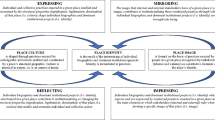Abstract
Conceptually, four aspects provide alternative visions to the traditional ‘spectacular’ World Cup that drowns out the personal and local, especially for rural South African citizens. First, the World Cup was transformed into a local event, as in the creation of a mini-World Cup for youth in the area. Second, the World Cup celebration was reconceived not just as a football event, but also as an opportunity to host alternative cultural events, particularly for rural residents. These included a film production and a ‘home-made’ candlelit dinner. Third, an international collaboration of local and Dutch artists introduced alternative celebratory occurrences (e.g., to transform prison blankets into fashion garments): while these were practical alternatives to the International Federation Football Association (FIFA)’s domination over World Cup products, they also have conceptual implications that transformed the multinational landscape of World Cup football events. What was evident was concepts revolving around notions of collaboration and creativity. Nevertheless, these alternatives did have their limitations in terms of scope and effectiveness, which is recognized in this chapter. After 2010, the engagement of some local groups in similar areas of cultural work, and in the arenas of sports and entertainment, can be observed. The value and level of commitment of these activities, despite a lack of resources, are also presented in this chapter.
The projects described in this chapter were all funded by SA’s NLTDF (National Lottery Distribution Trust Fund).
Access this chapter
Tax calculation will be finalised at checkout
Purchases are for personal use only
Preview
Unable to display preview. Download preview PDF.
Similar content being viewed by others
References
Achu, F. and Swart, K. (2012). African immigrants’ perception of the 2010 FIFA World Cup and its ‘African’ legacy. African Journal for Physical, Health Education, Recreation and Dance, 18(1): 33–41.
Alegi, P. (2006). The football heritage complex: History, tourism, and development in South Africa. Afrika Spectrum, 41(3): 415–26.
Burger, S. and Goslin, E. (2005). Best practice governance principles in the sports industry: An overview. South African Journal for Research in Sport, Physical Education and Recreation, 27(2): 1–13.
Cabral, A. (1974). Return to the Source: Selected Speeches by Amilcar Cabral. New York, NY: Africa Information Services, Monthly Review Press.
Celik, E. (2011). Exclusion of street traders from the benefits of the FIFA 2010 World Cup in South Africa. African Journal of Business and Economic Research, AJBER, Special Issue: 7–21,
Cornelissen, S. (2012). Our struggles are bigger than the World Cup: Civic activism, state-society relations and the socio-political legacies of the 2010 FIFA World Cup. The British Journal of Sociology, 63(2): 342–5.
Daby, P. (2003). The FIFA Presidency, and the governance of world football: 1974, 1998, and 2002. Africa Today, 50(1): 3–24.
Farhad, N. and Slobodian, N. (2012). The CSR Strategies of the MNCs to Ensure the Labor Rights of Migrant Workers: The 2022 FIFA World Cup Project in Qatar: The Case Study Based on Migrant Workers of Bangladesh, Dissertation Submitted for the Masters in Business Administration. Linkoping University: Department of Management and Administration.
Fanon, F. (1961). The Wretched of the Earth, France: Grove Press.
Giulianotti, R. and Robertson, R. (2004). The globalization of football: A study in the glocalization of the ‘serious life’. The British Journal of Sociology, 55(4): 545–68.
Harvey, J. (2009). Alterglobalization, global social movements, and the possibility of political transformation through sport. Sociology of Sport Journal, 26: 383–403.
Harvey, J. and Houle, F. (1994). Sport, world economy, global culture and new social movements. Sociology of Sport Journal, (11): 337–55.
Jarvie, G. (2011). Sport, social division and social inequality. Sport Science Review, XX(1–2): 95–109.
Jory, S.R. and Boojihawon, D. (2011). The economic implication of the FIFA 2010 World Cup in South Africa. African Journal of Business and Economic Research, Special Issue: 7–21.
Labuschagne, P. (2011). FIFA and the 2010 Soccer World Cup in South Africa: A developmental perspective. Africanus, 41(2): 32–45.
Maharaj, B. (2011). 2010 FIFA World Cup, (South) Africa’s time has come? South African Geographical Journal, 93(1): 49–62.
Matidze, K. and Palmer, G. (2010). FIFA and the media: An uneasy relationship. Without Prejudice, 10(2): 50–1.
Ngonyama, P. (2010). The 2010 FIFA World Cup: Critical voices from below. Soccer & Society, 11(1–2): 168–80.
Obeng, S. (1997). Selected speeches of Kwame Nkruma, Accra, Ghana, Africa publication, Africa-wide Information service.
Pillay, U., Tomlinson R. and Brass O. (2009). Development and Dreams: The Urban Legacy of the 2010 World Cup. Cape Town, South Africa: Human Sciences Research Council Press.
Rodney, W. (1972). How Europe Underdeveloped Africa. UK: Bogle-L’Ouverture Publications.
Internet and desktop sources
CD film of 2010 events, desktop photographs: personal copies.
http://sports.yahoo.com/blogs/soccer-dirty-tackle/qatar-2022-world-cup-organizers-accused-using-slave-144516170-sow.html
http://bleacherreport.com/tb/da3Mr?utm_source=newsletter&utm_medium=newsletter&utm_campaign=world-football
http://www.indexoncensorship.org/2014/02/brazil-bills-world-up-protest/
http://bleacherreport.com/tb/da3Mr?utm_source=newsletter&utm_medium=newsletter&utm_campaign=world-football
http://www.straschnow.com/projects/mafikeng-2010/
www.cascoland.com/2009/index2.php?cat=1&casco_cat
https://www.facebook.com/pages/Mahikeng/191313770994285
Editor information
Editors and Affiliations
Copyright information
© 2014 Kiran Odhav
About this chapter
Cite this chapter
Odhav, K. (2014). The 2010 World Cup Celebrations in a Non-hosting Location: Voices from the Periphery. In: Chari, T., Mhiripiri, N.A. (eds) African Football, Identity Politics and Global Media Narratives. Global Culture and Sport Series. Palgrave Macmillan, London. https://doi.org/10.1057/9781137392237_4
Download citation
DOI: https://doi.org/10.1057/9781137392237_4
Publisher Name: Palgrave Macmillan, London
Print ISBN: 978-1-349-48323-5
Online ISBN: 978-1-137-39223-7
eBook Packages: Palgrave Social Sciences CollectionSocial Sciences (R0)




